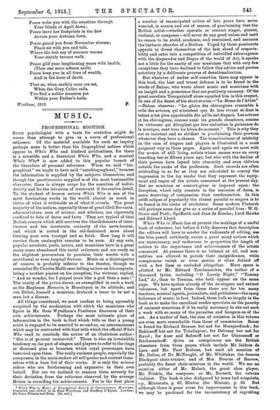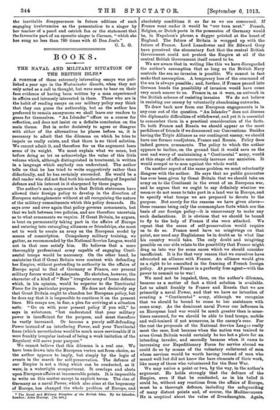MUSIC.
PROFESSIONAL EGOTISM.
SOME psychologist with a taste for statistics might do worse than attempt to give us a curve of professional reticence. Of the material available for such an inquiry perhaps none is better than the biographical notices which appear in TVho's Who and kindred publications, for there is a scientific and a theatrical Who's Who, and a musical Who's Who* is now added to this popular branch of the literature of personal reference. When we said "bio- graphical" we ought to have said "autobiographical," because the information is supplied by the subjects themselves, and though the questionnaire supplied is of the most businesslike character, there is always scope for the assertion of indivi- duality and for the intrusion of irrelevant if decorative detail. To the student of human nature Who's Who is one of the most fascinatine. works in the world, almost as much in virtue of what it withholds as of what it reveals. The great majority of the notices, especially those of great Civil Servants, administrators, men of science, and scholars, are rigorously confined to lists of dates and facts. They are typical of that British reserve which still survives the blandishments of inter- viewers and the inveterate curiosity of the news-hunter, and which is rooted in the old-fashioned saws about blowing your own trumpet and so forth. How long it will survive these onslaughts remains to be seen. At any rate, popular novelists, poets, actors, and musicians have in a great many cases abandoned this racial reticence, and are ready on the slightest provocation to proclaim their merits with a meridional or even tropical fervour. Music as a disintegrator of reserve is probably inferior to the theatre, though we remember Sir Charles Halle once telling us how on his congratu- lating a brother pianist on his reception, the virtuoso replied, " And no wonder, for I played more like a god than a man !" The vanity of the prima donna, as exemplified in such a work as the Mapleson Memoirs, is Himalayan in its altitude; and von Billow, himself a musician, declared a tenor to be not a man but a disease.
All things considered, we must confess to being agreeably surprised by the moderation with which the musicians who figure in Mr. Saxe Wyndham's Pantheon discourse of their own achievements. Perhaps the most intimate piece of information in the book is that which tells us that a young artist is engaged to he married to so-and-so, an announcement which may be contrasted with that with which the official Who's Who used to conclude the notice of an illustrious author: " She is at present unmarried." There is also an irresistible tendency on the part of singers and players to refer to the rings or diamond pins or brooches which royal personages have bestowed upon them. The really eminent people, especially the composers, in the main eschew all self-praise and content them- selves with a bare list of their works. It is only the minora sidera who are forthcoming and expansive in their own behalf. Nor are we inclined to censure them severely for their deviation from the reticence observed by the average Briton in recording his achievements. For in the first place
• Who's Who in Music : a Biographical Record of Contemporary Musicians. Compiled and edited by H. Saxe Wyndham and Geoffrey L'Epiue. Loudon: Sir Itanc Pitman and Sous. [8s. net.]
a number of emancipated critics of late years have never wearied, in season and out of season, of proclaiming that the British artist—whether operatic or concert singer, pianist, violinist, or composer—will never do any good unless and until he ceases to be stolid, academic, and restrained, and assumes the barbaric abandon of a Sicilian. Urged by these passionate appeals to divest themselves of the last shred of respecta- bility and enter into a competition of unbridled extravagance with the desperados and Dagos of the world of Art, it speaks not a little for the sanity of our musicians that with very few exceptions they have declined to follow this advice and pursue notoriety by a deliberate process of denationalization.
But whatever of undue self-assertion there may appear in this book, the best and truest defence is to be found in the words of Balzac, who wrote about music and musicians with an insight and a prescience that are positively uncanny. Of the great novelists Tourguenieff alone equalled him in this respect. In one of the finest of his short stories—"La Messe de l'Ithee" —Balzac observes : "La gloire des chirurgiens ressemble celle des acteurs, qui n'existent que de leur vivant et dont he talent n'est plus appreciable des qu'ils ont disparu. Les acteurs et les chirurgiens, comme aussi les grands chanteurs, comme les virtuoses qui decuplent par leur execution la puissance de la musique, sont tons les heros du moment." This is why they are so insistent and so strident in proclaiming their prowess whenever they have a chance. The transitoriness of celebrity in the case of singers and players is illustrated in a most poignant way in these pages. Again and again we meet with the names of still living artists whose names were on every hoarding ten or fifteen years ago, but who with the decline of their powers have lapsed into obscurity and even oblivion outside the ranks of the profession. Such records are often misleading in so far as they are calculated to convey the impression to the lay reader that they represent the equip- ment and vogue of the artists concerned at the present day. But no musician or concert-giver is imposed upon : the deception, which only consists in the omission of dates, is more deserving of compassion than condemnation. In this swift eclipse of popularity the closest parallel to singers is to be found in the ranks of cricketers. Some modern Plutarch will perhaps some day give us a series of parallel lives : W. G. Grace and Patti; Spofforth and Jean de Reszke; Lord Hawke and Edward Lloyd.
TI'ho's Who in Music has at present the makings of a useful book of reference, but before it fully deserves that description the editors will have to master the rudiments of editing, use the blue pencil ruthlessly, excise a great many notices which are unnecessary, and endeavour to proportion the length of notices to the importance and achievements of the artists concerned. At present there is no balance at all, and non- entities are allowed to parade their insignificance, while conspicuous talent or even genius is often fobbed off with a few lines or excluded altogether. More space is allotted to Mr. Edward Teschemacher, the author of a thousand lyrics, including " 0 Lovely Night," "Tommy Lad," Sze., than to Ternina, who both appear on the same page. We have spoken already of the ex-singers and extinct volcanoes, but apart from these there are far too many teachers, musical agents, journalists, and publishers—the camp followers of music, in fact. Indeed, these bulk so largely in the hook as to make the uncritical reader speculate on the paucity of eminent musicians if it be really necessary to eke out such a work with so many of the parasites and hangers-on of the art. As a matter of fact, the sins of omission in this volume are even more remarkable than those of commission. Room is found for Richard Strauss but not for Humperdinck ; for Baklonoff but not for Tchaliapine ; for Debussy but not for Ravel ; for Auer and Safonoff but not for Glazounoff or Rachmaninoff. Quite as conspicuous are the British absentees from these pages, which include Mr. Isidore de Lara and Mr. Paul Rubens, but omit all mention of Mr. Delius, of Dr. McNaught, of Mr. Whittaker, the famous Blackpool choir-trainer, and of Mrs. Bourne of Barrow, probably the finest choir-mistress in the world. We see no mention either of Mr. Malsch, the great oboe player, Mr. Friskin, the composer, or Mr. Burnett, the veteran violinist. The book is also disfigured by some bad misprint., e.g., Mizzucato, p. 63, Minton (for Hinton), p. 93. But although there is great room for improvement in this book, we may be pardoned for the inconsistency of regretting the inevitable disappearance in future editions of such engaging irrelevancies as the presentation to a singer by her teacher of a pearl and ostrich fan or the statement that the favourite part of an operatic singer is Carmen, " which she has sung no less than 760 times with 45 Don Joses."
C. L. G.







































 Previous page
Previous page